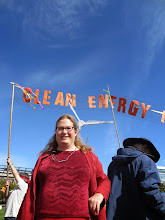Community own solar microgrids can bring energy ownership to everyone, fighting poverty and climate change at the same time.
- Joy
---------------
Around the world, approximately 1.4 billion people, or one in five, lack any access to electricity. Millions more are limited to only intermittent access. This is commonly referred to as "energy poverty." Energy poverty remains a primary barrier to improving economic growth and well-being in the world's poorest communities. It disproportionately affects people living in rural areas, as many energy-deficient communities are located in areas that are too remote or impoverished to attract investment for centralized grid access. Now, new off-grid clean energy technology is revolutionizing electricity access in developing countries around the world.
The lack of energy access negatively affects many areas of daily life. Energy poverty has left more than 1 billion people in developing countries without access to adequate health care because the lack of electricity means health care facilities have to treat patients in the dark and cannot store medical supplies in refrigerated, sterile environments. Without the ability to store vaccines, blood, and some medicines at a constant temperature, these potentially life-saving treatments may go to waste. In India, 46 percent of the country's health care facilities, which serve around 580 million people, operate without electricity.


No comments:
Post a Comment